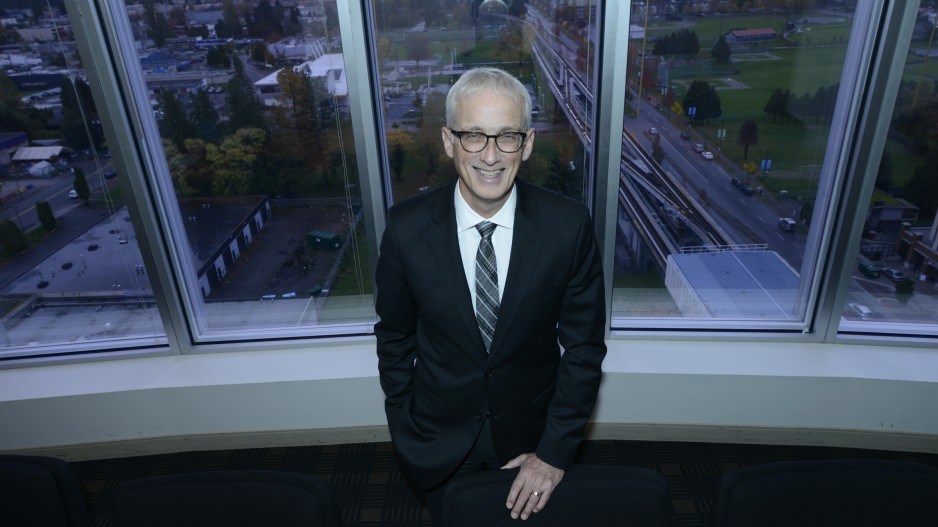Western Canada’s fastest-growing city is at a pivotal political crossroads, and the outcome of the municipal election looks to be anybody’s guess.
Surrey Mayor Dianne Watts is stepping down after close to a decade at the helm. Vying for her seat are three front-runners, former mayor Doug McCallum, who was unseated by Watts in 2005, and councillors Linda Hepner and Barinder Rasode.
A July Insights West poll leading up to the November 15 election showed McCallum with a strong lead, which could partially be attributed to name recognition from his terms as Surrey’s mayor from 1996 to 2005. However, the latest poll, released in mid-October, showed that lead dwindling and that almost half of potential voters were undecided.
While Watts, who announced she will be seeking the Conservative seat for South Surrey-White Rock in the 2015 federal election, helped choose Linda Hepner to succeed her at the helm of the Surrey First party, the popular mayor has been noticeably absent from the election cycle. Mario Canseco, vice-president of public affairs for Insights West, said Hepner is not going to be able to ride Watts’ afterglow to an easy win.
“We’re seeing the difficulty of following somebody that was that popular,” he said. “And it may also suggest that the Surrey First party is not as strong as a lot of people assumed. And we are getting a lot of respondents who are saying that they want to see some balance.”
Canseco pointed to crime, Surrey’s top election issue, as possibly being a “dichotomy” when it comes to Watts. While she has a high overall approval rating (73%), respondents ranked her handling of crime at the very bottom of her list of achievements. Only 16% said she did a “good” job of handing the issue of crime and public safety.
“When we asked the question of who is going to be the best candidate to handle crime,” Canseco said, “it is essentially a three-way tie.”
James Stewart, chair of the Downtown Surrey Business Improvement Association and a lawyer in the city since 1980, said crime is the top issue for good reason, as recent high-profile murders in Surrey continue to grab media headlines. However, there’s a wealth of other issues that appear to be falling by the wayside, he said.
“I think the overwhelming message has been one of public safety, and I don’t think you can really downplay that,” Stewart said. “But there are a lot of other things going on, and the concern for public safety seems to have outstripped the reality of the situation.
“Unfortunately with the situation in Surrey around public safety, it’s one person starts shouting and then everyone else has to shout louder and louder and louder. And it’s almost as if the theme takes over instead of the substance.”
Stewart said he has yet to see a “decisive” candidate appear and is a bit “disappointed in the level of rhetoric.” In a city with unparalleled economic growth, much of which could be attributed to strong leadership over the past decade, it creates an interesting conundrum for candidates seeking to get their messages across, he added.
“To get the attention of all levels of media and the public, you can’t campaign and say, ‘Elect me and I’ll do the exact same thing as my opponent has been doing for the last 10 years.’”
One element that could play a part in the outcome of the election is ethnicity. Barinder Rasode, who polled the lowest of the three front-runners, hopes to become the first Sikh female mayor in North America. Canseco said he’s noticed radio spots keying on Rasode’s ethnic background.
“They are really trying to channel that, in making [the election] a historic night for the South Asian community. And essentially trying to play up that role, that this is one of those opportunities to do something historic.”
Stewart said the “norm in Surrey is multiculturalism” and the South Asian community is a political force, but not one any candidate should count on.
“I don’t think it’s a [voting] bloc. I don’t think they would vote as a bloc and I don’t think that they would necessarily vote just because someone is South Asian. I think a lot of the other candidates have a lot of support from the South Asian community as well.”
Voter turnout still an issue
Another factor in the municipal election is the dismal voter turnout record. Only one in four Surreyites voted in the last election, and according to Insights West, only 9% of people polled said they are following the election campaign “very closely.” Further, about half of Surrey residents are either following the campaign “not too closely” or “not closely at all.”




